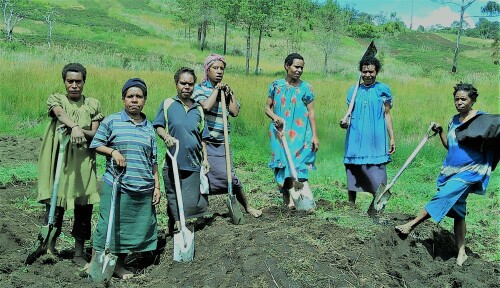Women of Wonepap. Photo: LPRA
Lagaip Poverty Relievers Association secures funds for agriculture and cultural tourism through mobile technology and the European Union’s Low Value Grants.
In Wonepap Village, of Enga province, Mr. Tony Sulupin was concerned about the growing poverty of his people. He noticed that households were living on just ten Kina (US$3) a month. They could not afford to buy essential household items and parents could not afford to send their children to school.
Mr. Sulupin had a plan for improving the livelihoods of people in communities via sustainable farming. In 2010, he formed a community-based organization – the Laigap Poverty Reliever’s Association – with 100 registered farmers, and a goal to be financially sustainable.
“We want to support farmers to enhance their livelihoods by making use of the land and water resources, bushes, forest resources, cultures and traditions – to generate income, to improve their living standards,” he explains.
This community organization works together to find lasting solutions to address gender issues, disabilities, and other cross cutting challenges such as unemployment, opportunities for school leavers, and targeting marginalized populations to help themselves to better their livelihoods.
Mr. Sulupin, who holds a degree in agriculture from the Divine Word University, is bound to a wheelchair after contracting Tuberculosis in his spine in 2013, which led to him losing his ability to walk. With pure determination, he has been reaching out to various potential fund providers but was always unsuccessful.
The growth in digital technology in his area allowed a window of hope. On social media, he saw an advertisement by UNDP – a Call for Low Value Grant Proposals, funded by the European Union. Through his mobile phone, he found the solution he had been searching for.
“My mobile phone was a powerful technology tool. I could access online and found out about the funding announcement, an initiative led by the UNDP, and applied for it.”
This successful grant award of K95,000 (US$27 000) has provided the seed funding to improve key agricultural, livelihood and tourism activities in Lagaip District, including development of a potato seedlings farm, with bulb onion and garlic commercialization, capacity and skills training provided to the 100-member community, as well as cultural tourism promotion.
As President of the Association, Mr. Sulupin explains how the grant will make a significant impact on the future of the enterprise plans.
“With scalability, we aim to target the Port Moresby market once production reaches target volume. This project will make radical impacts on the way of life in this community as well as making significant contribution to the local economy of the country.”
As umbrella organization of the Lagaip Rural Economic Development Program launched in 2020, this initiative includes proposed projects such as the Potato Seed Multiplication Project, and the Inland Fish Farming Project targeted at mitigating poverty.
“Now the 50-fish farmers have been instructed and started to dig five fishponds per farmer, and this fund will help them successfully carry out their farming,” he said.
Mr. Sulupin estimates that within five years, there will be notable overall improvement in their quality of living standards such as housing, sanitation, good food and nutrition, education and clothing. What advice does Mr Sulupin have for other community-based organizations, in Enga, for a successful grant application?
“Potential bidders should work on their land and really know about their needs and their projects,” he says. “Do not just become farmers by paper.”
About: The Low Value Grants (LVG) are part of the European Union-funded Strengthening Integrated Sustainable Landscape Management Project, implemented by UNDP. The project has three Strategic Objectives: (1) improving climate change mitigation and adaptation; (2) strengthening food and nutrition efforts; and (3) improving biodiversity and land/forest conservation. LVG disbursements are established as seed funding and financing opportunities to support community-based projects to improve and support climate-friendly livelihood opportunities. By 2022, the project aims to provide more than 40 grantees the funds to strengthen sustainable and inclusive economic development, in Enga Province of Papua New Guinea.

 Locations
Locations




